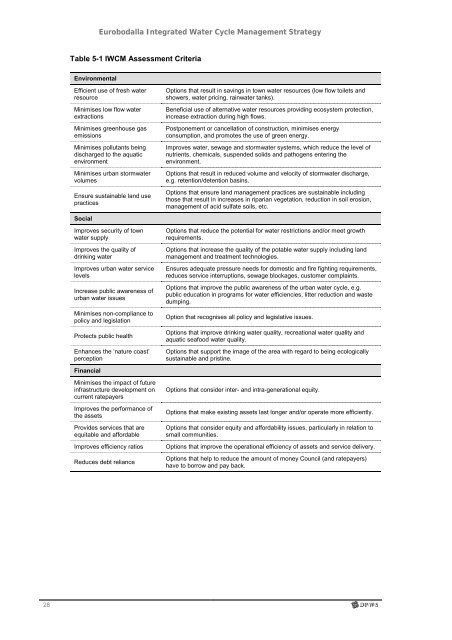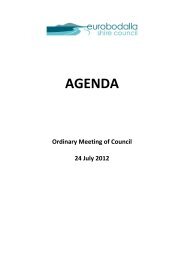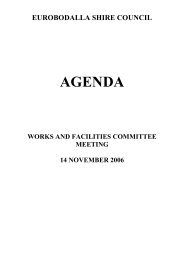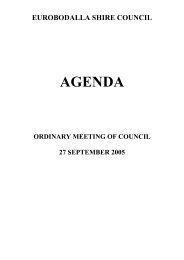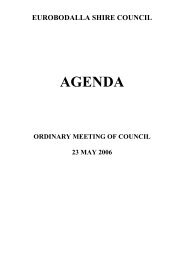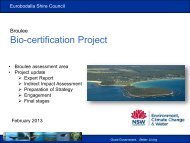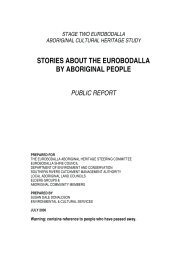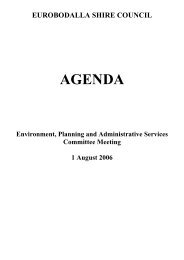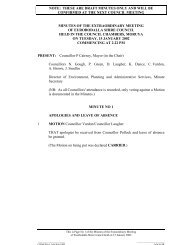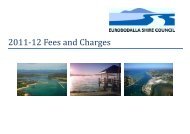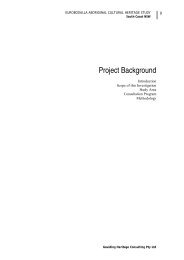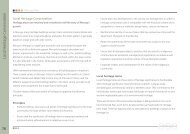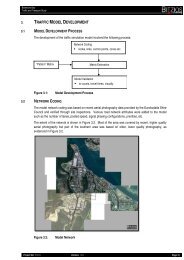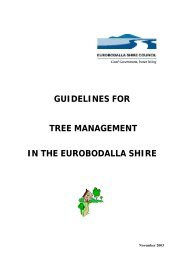Eurobodalla Integrated Water Cycle Management Strategy
Eurobodalla Integrated Water Cycle Management Strategy
Eurobodalla Integrated Water Cycle Management Strategy
You also want an ePaper? Increase the reach of your titles
YUMPU automatically turns print PDFs into web optimized ePapers that Google loves.
28<br />
<strong>Eurobodalla</strong> <strong>Integrated</strong> <strong>Water</strong> <strong>Cycle</strong> <strong>Management</strong> <strong>Strategy</strong><br />
Table 5-1 IWCM Assessment Criteria<br />
Environmental<br />
Efficient use of fresh water<br />
resource<br />
Minimises low flow water<br />
extractions<br />
Minimises greenhouse gas<br />
emissions<br />
Minimises pollutants being<br />
discharged to the aquatic<br />
environment<br />
Minimises urban stormwater<br />
volumes<br />
Ensure sustainable land use<br />
practices<br />
Social<br />
Improves security of town<br />
water supply<br />
Improves the quality of<br />
drinking water<br />
Improves urban water service<br />
levels<br />
Increase public awareness of<br />
urban water issues<br />
Minimises non-compliance to<br />
policy and legislation<br />
Protects public health<br />
Enhances the ‘nature coast’<br />
perception<br />
Financial<br />
Minimises the impact of future<br />
infrastructure development on<br />
current ratepayers<br />
Improves the performance of<br />
the assets<br />
Provides services that are<br />
equitable and affordable<br />
Options that result in savings in town water resources (low flow toilets and<br />
showers, water pricing, rainwater tanks).<br />
Beneficial use of alternative water resources providing ecosystem protection,<br />
increase extraction during high flows.<br />
Postponement or cancellation of construction, minimises energy<br />
consumption, and promotes the use of green energy.<br />
Improves water, sewage and stormwater systems, which reduce the level of<br />
nutrients, chemicals, suspended solids and pathogens entering the<br />
environment.<br />
Options that result in reduced volume and velocity of stormwater discharge,<br />
e.g. retention/detention basins.<br />
Options that ensure land management practices are sustainable including<br />
those that result in increases in riparian vegetation, reduction in soil erosion,<br />
management of acid sulfate soils, etc.<br />
Options that reduce the potential for water restrictions and/or meet growth<br />
requirements.<br />
Options that increase the quality of the potable water supply including land<br />
management and treatment technologies.<br />
Ensures adequate pressure needs for domestic and fire fighting requirements,<br />
reduces service interruptions, sewage blockages, customer complaints.<br />
Options that improve the public awareness of the urban water cycle, e.g.<br />
public education in programs for water efficiencies, litter reduction and waste<br />
dumping.<br />
Option that recognises all policy and legislative issues.<br />
Options that improve drinking water quality, recreational water quality and<br />
aquatic seafood water quality.<br />
Options that support the image of the area with regard to being ecologically<br />
sustainable and pristine.<br />
Options that consider inter- and intra-generational equity.<br />
Options that make existing assets last longer and/or operate more efficiently.<br />
Options that consider equity and affordability issues, particularly in relation to<br />
small communities.<br />
Improves efficiency ratios Options that improve the operational efficiency of assets and service delivery.<br />
Reduces debt reliance<br />
Options that help to reduce the amount of money Council (and ratepayers)<br />
have to borrow and pay back.


